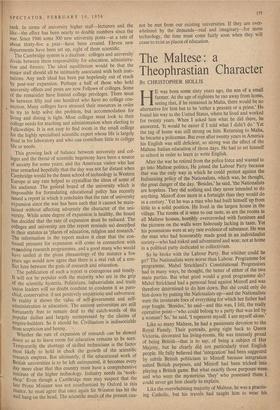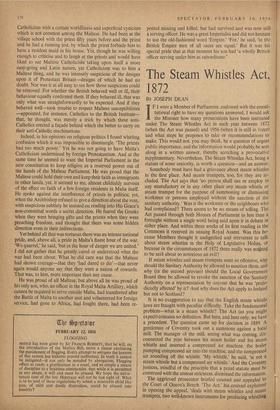The Maltese : a Theophrastian Character
BY CHRISTOPHER HOLLIS HE was born some sixty years ago, the son of a small farmer. At the age of eighteen he ran away from home, seeing that, if he remained in Malta, there would be no alternative for him but to be `either a peasant or a priest.' He found his way to the United States, where he lived and worked for twenty years. When I asked him what he did there, be answered, 'It would be easier if I told what I didn't do.' Yet the tug of home was still strong on him. Returning to Malta, he became a policeman. But even after twenty years in America his English was still deficient, so strong was the effect of the Maltese Italian education of those days. He had to set himself to school in order to learn to write English.
After the war he retired from the police force and wanted to go into Maltese politics, He joined the Labour Party because that was the only way in which he could protest against the Italianising policy of the Nationalists, which was, he thought, the great danger of the day. 'Besides,' he said, 'the Nationalists are hopeless. They did nothing and they never intended to do anything. Mintoff does more in a fortnight than they would do in a century.' Yet he was a man who had built himself up from little to a solid position. He lived in the largest house in the village. The rooms of it were to our taste, as are the rooms in all Maltese houses, horribly overcrowded with furniture and the pictures on the walls were hideously lacking in taste. Yet his possessions were at any rate evidence of substance. He was the man who had honourably made good in an individualist society—who had risked and adventured and won; not at home in a political party dedicated to collectivism.
So he broke with the Labour Party. But whither could he go? The Nationalists were worse than Labour. Programme for programme, Mabel Strickland's Constitutional Progressives had in many ways, he thought, the better of either of the two main parties. But what good would a 'good programme do? Mabel Strickland had a personal feud against Mintoff and was therefore determined to do him down. But she' could only do him down by putting the Nationalists up—and the Nationalists were the inveterate foes of everything for which her father had ever fought. 'Besides,' he said—and this was, I felt, the really operative point—'who could belong to a party that was led by a woman? So,' he said, 'I represent myself. I am myself alone.'
Like so many Maltese, he had a passionate devotion to the Royal Family. Their portraits, going right back to Queen Victoria, decorated his living-rooms. He was intensely proud of being British—that is to say, of being a subject of Her Majesty, but he clearly did not particularly trust English people. He fully believed that 'integration' had been suggested by subtle British politicians to Mintoff because integration suited British purposes, and Mintoff had been tricked into playing a British game. But what exactly those purposes were and who were the mysterious 'they' who possessed them I could never get him clearly to explain.
Like the overwhelming majority of Maltese, he was a practis- ing Catholic, but his travels had taught him to wear his Catholicism with a certain worldliness and superficial cynicism which is not common among the Maltese. He had been at the village school with the priest fifty years before and the priest and he had a running jest, by which the priest forbade him to have a resident maid in his house. Yet, though he was willing enough to criticise and to laugh at the priests and would have liked to see Maltese Catholicism taking upon itself a more easy-going and Latin nature, yet Catholicism was to him a Maltese thing, and he was intensely suspicious of the designs upon it of Protestant Britain—designs of which he had no doubt. Nor was it at all easy to see how those suspicions could be removed. For whether the British behaved well or ill, their behaviour equally confirmed them. If they behaved ill, that was 'only what was straightforwardly to be expected. And if they behaved well—took trouble to respect Maltese susceptibilities —appointed, for instance, Catholics to the British Institute— that, he thought, was merely a trick by which these anti- Catholics erected a façade behind which the better to carry on their anti-Catholic machinations.
Indeed, in his opinions on religious politics I found whirling confusion which it was impossible to disentangle. 'The priests had too much power.' Yet he was not going to have Malta's Catholicism undermined by foreign Protestantism. And at the same time he seemed to want the Imperial Parliament in the ucw constitution to keep religion as a reserved power out of the hands of the Maltese Parliament. He was proud that the Maltese could hold their own and keep their faith as immigrants in other lands, yet, it seemed to me, almost childishly nervous of the effect on faith of a few foreign residents in Malta itself. He spoke against the interference of priests in politics; yet, when the Archbishop refused to give a direction about the vote, with suspicious subtlety he insisted on reading into His Grace's non-committal words a secret direction. He feared the Greeks when they were bringing gifts and the priests when they were preaching freedom, and thought that there was some hidden direction even in their indirections.
Yet behind all that was tortuous there was an intense national pride, and, above all, a pride in Malta's finest hour of the war. 'We quarrel,' he said. 'but in the hour of danger we are united.' I did not gather that he greatly cared or understood what the war had been about. What he did care was that the Maltese had shown courage—that they 'had dared to die'—that never again would anyone say that they were a nation of cowards. That was, to him, more important than any cause.
He was proud of all Maltese, but above all he was proud of his only son, who, an officer in the Royal Malta Artillery, which cannot be required to serve outside Malta, had transferred after the Battle of Malta to another unit and volunteered for foreign service, had gone to Africa, had fought there, had been re- ported missing and killed, but had survived and was now still a serving officer. He was,a great Imperialist and did not hesitate to use the old-fashioned word 'Empire.' For,' he said, 'in the British Empire men of all races arc equal.' But it was his special pride that at that moment his son had 'a wholly British officer serving under him as subordinate.'



































 Previous page
Previous page